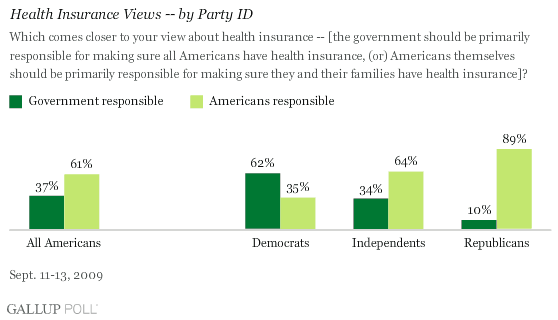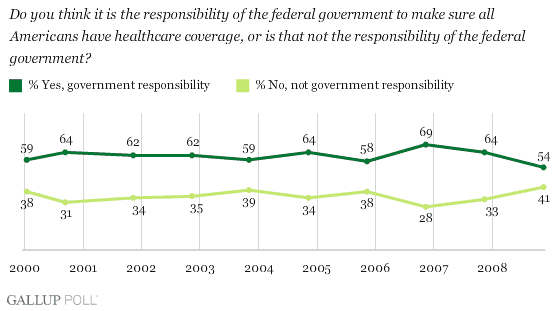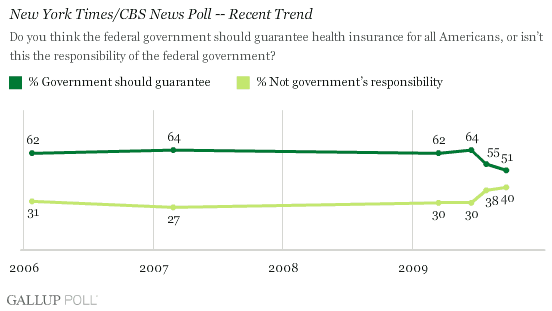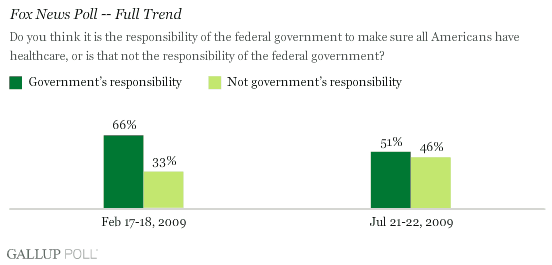PRINCETON, NJ -- In a recent Gallup survey, 89% of Republicans, 64% of independents, and 61% of Americans overall say Americans themselves -- rather than the government -- have the primary responsibility for ensuring that they have health insurance. Six in 10 Democrats say the government should be primarily responsible.

Other national polls on this topic have found a higher degree of public support for government involvement in guaranteeing healthcare coverage, but those question wordings do not provide a non-governmental alternative.
For example, a Gallup question asks, "Do you think it is the responsibility of the federal government to make sure all Americans have healthcare coverage, or is that not the responsibility of the federal government?" The latest results, from November 2008, show 54% of Americans agreeing that it is the federal government's responsibility, and 41% disagreeing. While that 54% support is the lowest in Gallup trends -- the peak being 69% in November 2006 -- it is still the majority view.

A question that the New York Times/CBS News poll has asked periodically since 1996 yields a similar result in its latest, mid-September update. In answer to "Do you think the federal government should guarantee health insurance for all Americans, or isn't this the responsibility of the federal government?" 51% of Americans say it is the government's responsibility; 40% disagree. (This reflects a decline in the "government responsibility" reading from earlier in 2009, and is the lowest such reading on this question in the poll's history of asking it.)

In July, a Fox News poll asked, "Do you think it is the responsibility of the federal government to make sure all Americans have healthcare, or is that not the responsibility of the federal government?" At that time, 51% of Americans said it was the government's responsibility and 46% disagreed -- again, a significant drop from earlier this year.

Given the declines in public support for government responsibility seen this year in both the New York Times/CBS News and the Fox News polls, it will be important to see if the Gallup variant of the same question -- due to be updated in Gallup's November Health and Healthcare survey -- shows a similar shift.
The differing results to questions asking about government responsibility for health insurance may not be contradictory. A reasonable hypothesis could be that Americans generally believe people should take responsibility for their own healthcare coverage, while at the same time believing the government should provide a safety net for those who need it.
A system in which Americans are "primarily responsible" for their families' health insurance -- as the new Gallup question is phrased -- would not preclude having a government-based insurance program for the poor, such as the Children's Health Insurance Program (CHIP) or Medicaid. By the same token, public support for the government's making sure "all Americans have healthcare coverage" -- as other questions are phrased -- isn't tantamount to support for mandated health insurance or a universal government-run system.
Bottom Line
An important principle behind the current push for healthcare reform is that healthcare is a basic right that the government ought to guarantee for all Americans. Not only are the details of achieving universal coverage proving to be highly controversial, but it is unclear how strongly Americans support the premise.
Americans tend to agree with the government's taking responsibility for guaranteeing healthcare coverage when asked in "yes or no" terms. However, they are more libertarian on the issue when asked whether the government or individual citizens should be primarily responsible for ensuring that coverage.
Survey Methods
Results are based on telephone interviews with 1,030 national adults, aged 18 and older, conducted Sept. 11-13, 2009. For results based on the total sample of national adults, one can say with 95% confidence that the maximum margin of sampling error is ±4 percentage points.
Interviews are conducted with respondents on land-line telephones (for respondents with a land-line telephone) and cellular phones (for respondents who are cell-phone only).
In addition to sampling error, question wording and practical difficulties in conducting surveys can introduce error or bias into the findings of public opinion polls.
